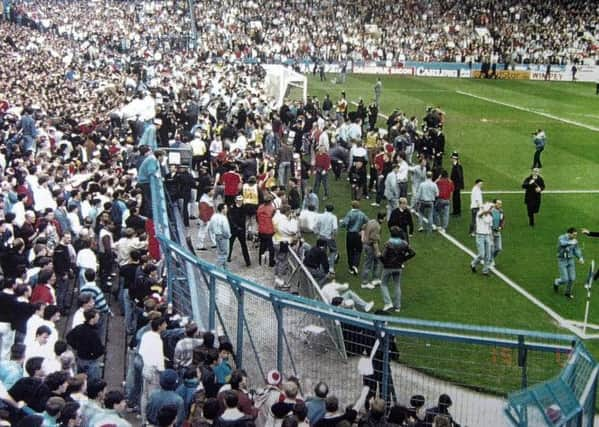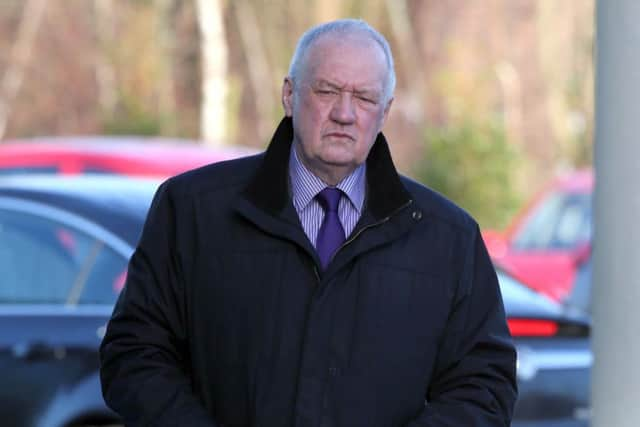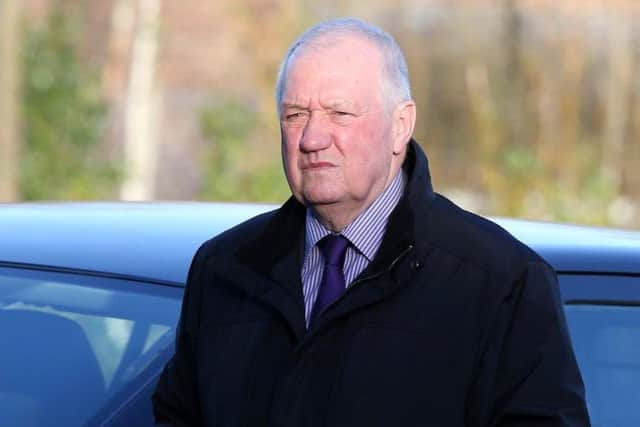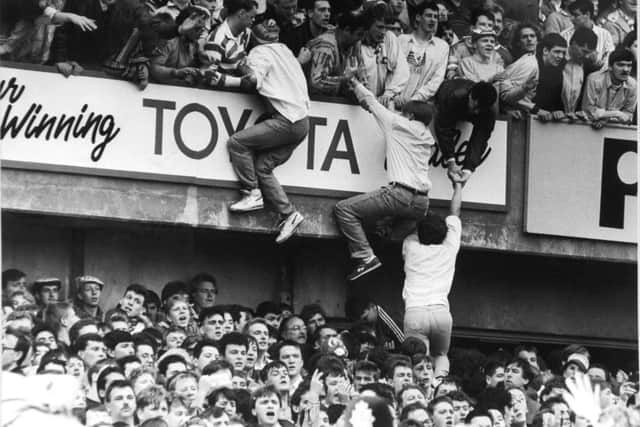I was wrong man for the job admits police chief as he faces Hillsborough families


David Duckenfield told inquests into the deaths of 96 Liverpool fans that in the days leading up to the tragedy he had no concerns about his lack of experience.
He was promoted to divisional commander by South Yorkshire Police only a few days before the match and was also involved in moving to a new headquarters.
Advertisement
Hide AdAdvertisement
Hide AdMr Duckenfield was asked by Christina Lambert QC, counsel to the inquests, whether he had any concerns about being sufficiently equipped to take on the role.
He replied: “No, ma’am. I accepted the job and was looking forward to the challenge.”
But he said: “In hindsight, I should have thought about my limited knowledge of a role of commander in a major event that was an all-ticket sell-out, when I had not been in that responsible position before.”
Mr Duckenfield was asked whether this realisation came immediately after the tragedy or with the benefit of hindsight.
Advertisement
Hide AdAdvertisement
Hide AdIn a quiet, Yorkshire accent, he said: “After 25, 26 years, and knowing what had happened, I cannot differentiate between the two. After a period of ‘I am older, I am hopefully wiser’, probably I was not the best man for the job on the day.”
During the hearing in Warrington, Mr Duckenfield spoke about his policing background and said that at the time of the tragedy he had no recent experience of policing at Sheffield Wednesday’s home ground.
He said he was chief inspector at the players’ tunnel during a semi-final at the stadium between Liverpool and Arsenal in 1980 and had previously been involved with policing at Bramall Lane, Sheffield United’s ground.
He said: “My view was that I had been selected for my overall capabilities and it didn’t cross my mind that the semi-final was something that I couldn’t deal with, with the assistance I had been promised of those very skilled people around me.”
Advertisement
Hide AdAdvertisement
Hide AdHe added: “It did call for people with deep experience but I was assured by Mr Jackson, the Assistant Chief Constable, that whatever experience I lacked, those around me, who were very experienced officers, they were men of considerable calibre and experience that I could rely upon to assist me on the day.


“My knowledge of the ground was not an intimate knowledge, in the time available it could not possibly be. But I hoped and believed and was assured that the team that had specially selected for me by [former match commander Brian] Mole would provide the necessary expertise.”
He said he believed an approach to the chief constable would need to be made for control of the match to be taken away from him and handed back to Mr Mole.
He said: “In theory one would think the chief constable could have said Mr Mole would continue for the match.”
Advertisement
Hide AdAdvertisement
Hide AdBut he said: “There was a culture in the police service at that time that you would be moved without an overlap and would learn on the job.


“When we moved to whatever role, I am not talking about this particular one, there was a culture of moving people around.
“It didn’t cross my mind to say ‘I am not up to the job’, I just got on with it.”
He said that with hindsight, this was a “serious mistake”. He said: “It was a serious mistake with hindsight, knowing the events on the day, that I continue in the role.”
Advertisement
Hide AdAdvertisement
Hide AdThe hearing was told that Mr Duckenfield attended two pre-match planning meetings on March 22 and 29, both chaired by Mr Mole, and that he couldn’t remember having other informal discussions about what would happen.
He said his understanding was that Mr Mole would make the arrangements for the match and “oversee the launch of the operational order” as well as selecting who would be involved.
Ms Lambert said West Midlands Police had looked into whether minutes had been taken of the meeting and found that a secretary called Mrs Todd had taken minutes.


A South Yorkshire Police document said these notes had been turned into longhand and then given to Mr Duckenfield, but he denied this had happened.
Advertisement
Hide AdAdvertisement
Hide AdHe said: “I can assure you that as far as I am concerned no minutes were taken at the meeting and as far as I am concerned I never had a copy of those minutes.”
He added: “There is absolutely no reason why someone like myself would obtain a copy of minutes and then destroy them, because as far as I am concerned there was nothing at that meeting or in those minutes that was detrimental to anyone.”
Mr Duckenfield said that he was not aware of crushing among fans at Hillsborough during a 1981 semi-final at the time of the tragedy and only learned about this in the last two years.
He was asked about concerns expressed by police at the time that the capacity for the Leppings Lane terrace was not sufficient.
Advertisement
Hide AdAdvertisement
Hide AdHe replied: “This is an area where I am confused in that I have heard [Superintendent Roger] Greenwood since this unfortunate incident make mention of that. But I have no specific recollection of him saying to me ‘you must bear in mind this, this and this’.”
Mr Duckenfield said he made arrangements to spend a day with Brian Mole, his predecessor as match commander, before the game, so he could be introduced to senior staff at Sheffield Wednesday.
But he said: “For whatever reason that didn’t take place. I went to see Mr Mole, expecting to have a whole day with him.
“I my view he was disappointed to be moving, wanting to clear his desk, jealously guarding his relationships with Sheffield Wednesday, and offered me little or no advice.”
Advertisement
Hide AdAdvertisement
Hide AdHe said he was not told officially why Mr Mole was being moved to Barnsley but said he had heard rumours of indiscipline within his team.
He said: “I do recall him saying to me ‘I have made all the arrangements, it is all sorted out, you have not got to worry about the operational order. I have done the order, I have picked all the staff.”
He added: “Mr Mole was a very insular character in my view. I took the view that he was making it quite plain to me that he was very busy and it was probably not the appropriate time to spend with him.”
During the afternoon session, Mr Duckenfield admitted there were “deficiencies” in the way the match order was drafted for officers because no mention had been made of monitoring the filling of the pens or filtering fans on their way to the stadium.
Advertisement
Hide AdAdvertisement
Hide AdAsked by Ms Lambert if he accepted any role in these deficiencies, he replied: “I was chief superintendent in charge on the day. I signed the order, so I must accept responsibility.”
Ms Lambert said to him: “Before the match you were not concerned about monitoring the filling of the pens in the Leppings Lane terrace, it was not something you focused upon.”
He said: “I focused on many things but nothing drew my attention to particularly focus on that.”
Ninety-six Liverpool fans died following a crush on the Leppings Lane terrace of Sheffield’s Hillsborough ground as the FA Cup semi-final against Nottingham Forest kicked off on April 15 1989.
Advertisement
Hide AdAdvertisement
Hide AdMr Duckenfield gave the order to open gates, allowing 2,000 fans massing outside the turnstiles into the ground in the minutes before the fatal crush.
He later told FA officials wrongly that a gate had been forced open, in comments repeated by the press.
Mr Duckenfield took over as Hillsborough commander three weeks before the semi-final.
The jury has heard it was his first experience of policing a sell-out 54,000 crowd at the venue and most of his policing had been in criminal investigations, rather than public order.
Advertisement
Hide AdAdvertisement
Hide AdAs fans massed at the turnstiles in the minutes before kick-off, Superintendent Roger Marshall, who was responsible for the Liverpool fans’ section, repeatedly requested that exit gates be opened to ease the pressure outside, otherwise “somebody would be killed”.
Mr Duckenfield took “some minutes” to make a decision, but believing it was too late to delay kick-off, gave the order at 2.52pm, saying: “If there is likely to be a serious injury or death, I’ve no option but to open the gates. Open the gates.”
Around 2,000 fans then made their way into the ground as Gate C was opened, many heading straight for a tunnel leading directly to pens 3 and 4 behind the goal, already densely packed with fans.
A tactic of police blocking off the tunnel leading into the central pens to disperse fans into other pens on the terrace was not followed on the day, as in previous matches.
Advertisement
Hide AdAdvertisement
Hide AdA father and son, four pairs of siblings, and a boy of 10 were among the 96 fans crushed to death in the pens.
In the immediate aftermath, Mr Duckenfield told FA executives the gates had been forced open.
This was passed on to the media, causing “some seriously inaccurate reporting of events”, but the jury has been told there is “no question” of Gate C ever being forced open.
Verdicts of accidental death from the original Hillsborough inquest in March 1991 were quashed in December 2012.
READ MORE...